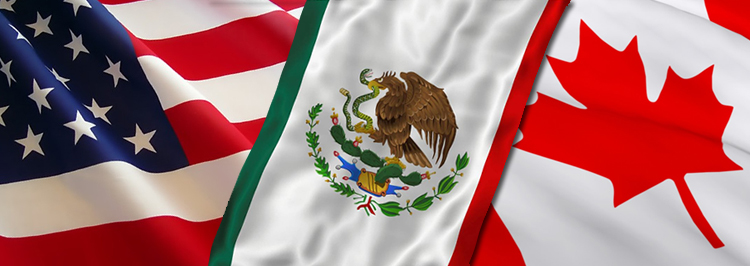The Coalition for a Prosperous America (CPA) expressed support for President Trump and his trade team taking aggressive and unconventional steps to craft a new trade arrangement with Mexico. We continue to study the newly announced agreement.
“This is another example of President Trump living up to his campaign promises by renegotiating or terminating the North American Free Trade Agreement (NAFTA) and pursuing bilateral trade deals instead,” said Dan DIMicco, Chairman of CPA. “Despite vociferous opposition from Congress, foreign companies and the import lobby, the President and his trade team continue to work hard for domestic producers.”
“We support the administration’s work to gain trade leverage and overturn the past policy of unilateral trade disarmament which caused offshoring and wage stagnation,” said Michael Stumo, CEO of CPA. “If Canada refuses to negotiate, they should not expect to be included.”
Previously reports by CPA have shown that US trade performance with Mexico significantly worsened after NAFTA was implemented in 1994. The details of the new US-Mexico trade agreement have yet to be fully revealed. Some basic information has been released.
Rules of Origin: Progress appears to have been made on rules of origin in several manufacturing sectors. Seventy five percent (75%) of auto content must be made in the US and Mexico under the agreement, which at first blush is an increase from the current NAFTA.
Other rules of origin on chemicals, steel intensive products, glass and optical fiber have been announced. Strong rules of origin are necessary to prevent China and other countries from shipping product through Mexico to the US. Certification and verification of rules of origin are also to be strengthened, which provides for more effective enforcement to prevent duty evasion. CPA will study those rules as more details are released.
Labor Content Rules: An intriguing new labor value content rule will require that 40-45% of auto content be made by workers earning at least $16 per hour. That rule, if implemented, could further increase the proportion of US content in autos because Mexican workers make far below that amount. The specific provisions of this rule are important and remain to be seen.
Agriculture: Agricultural goods will purportedly continue receiving zero tariff treatment. Corn and soybean farmers will be supportive because they are net exporters to Mexico. Fruit and vegetable growers as well as cattle producers, however, have suffered from cheap Mexican net imports that have displaced their share of the US consumer market. We remain hopeful country of origin labeling for meats was included in the deal, though early reports are silent on this issue. Canada and Mexico were the instigators of a World Trade Organization proceeding that wrongly found that America’s country of origin meat labeling rules violated international trade rules. Foreign and multinational food companies oppose informing consumers about where their food comes from. Section 232 Tariffs on Steel and Aluminum: While early announcements did not discuss the section 232 tariffs on steel and aluminum, CPA has heard that the tariffs will remain in place as to Mexico or be shifted to quotas so as to prevent a surge of direct or trans-shipped imports from Mexico. Misaligned Exchange Rates: Early reports are silent as to whether currency is included in the US-Mexico deal. We look forward to learning more. Whether or not included, America should implement unilateral measures such as charges on excessive foreign capital inflows that drive the US dollar too high. The strong dollar, supported by Wall Street financiers that sell dollar assets, depresses US exports of goods and services and subsidizes imports. The US needs a competitive dollar price to eliminate the trade deficit, increase wages and grow domestic production. CPA will continue supporting the President and his trade team on efforts to grow valued added food and goods supply chains in the US, balance trade, and transition towards strategic trade policies that benefit American producers. [Fact sheets distributed by the Office of the US Trade Representative can be found at the following links. Manufacturing Fact Sheet, Agriculture Fact Sheet, Intellectual Property Fact Sheet.] About CPA: The Coalition for a Prosperous America is the nation’s premier organization working on the intersection of trade, jobs, tax, and economic growth. We represent the interests of 4.1 million households through our agricultural, manufacturing, and labor members.













